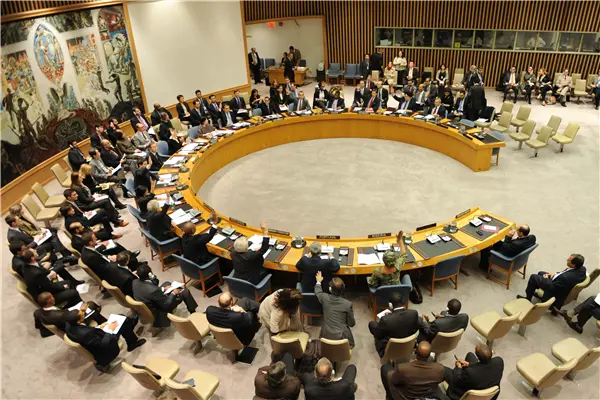The UN Security Council on Friday shelved Russia's proposal against the idea of sending ground forces to Syria, as international efforts to bring peace to the war-ridden country have stumbled.
The UN Security Council met Friday afternoon to discuss a draft resolution broached by Russia over concerns about the deteriorating Syrian-Turkish border situation and Turkey's calls to send ground forces to Syria.
After a closed-door meeting, Ambassador Rafael Ramirez Carreno of Venezuela, this month's president of the panel of 15, told reporters that the UN body decided to consider the proposal over the weekend and bring it up on Monday.
"We are ready to call an extraordinary meeting (over the weekend) if necessary," he added.
The deputy permanent representative of Russia to the United Nations Ambassador Vladimir Safronkov said, "The main elements of the draft resolution demand all parties to refrain from interfering in Syria; to fully respect its sovereignty and independence; abandon plans for ground operations which would undermine all fundamental decisions of Resolution 2254."
The resolution was approved by the council in December and endorsed a roadmap for peace in Syria.
"This is a distraction," said U.S. Ambassador Samantha Power. The Moscow move, she said, aimed to divert world attention from its "bombing campaign in northern Syria."
Ambassador Halit Cevik of Turkey said Ankara respected the territorial integrity and sovereignty of Syria and is in favor of a political solution in Syria. "The crisis in Syria has been affecting Turkey significantly."
Turkey recently ratcheted up its cross-border shelling in areas dominated by the Syria Democratic Forces (SDF), the predominantly Kurdish coalition, in response to what it called hostile fire coming across the border into Turkey.
SDF, one of the major forces on the ground fighting against the Islamic State, is backed by the U.S. air campaign and made territorial gains in northern Syria. However, Ankara says the group is composed of hostile insurgents.
Meanwhile, Ankara has called on coalition partners to launch joint ground operations in Syria, insisting it is the only way to end the country's nearly five-year-old civil war.
"Without a ground operation, it is impossible to stop this war ... Turkey is not going to have a unilateral ground operation ... We are discussing this with allies," a Turkish official told reporters in Istanbul on Tuesday.
Deep rifts among world powers played out in the international efforts to end the Syria's complex and multi-layered civil war, threatening to leave the peace progress in disarray.
With little sign of a ceasefire on the ground, the U.S. and Russia on Friday held talks in Geneva to push forward the implementation of a peace deal on Syria.
The agreement, reached on Feb. 12 in Munich among members of the International Syria Support Group (ISSG), involves plans to initiate a nationwide cessation of hostilities in Syria soon and deliver humanitarian aid to besieged area of the war-battered country.
"Russia and the United States are holding consultations at the expert level in Geneva on those issues that will be submitted for the (broader international) group's approval," Russian Foreign Ministry spokeswoman Maria Zakharova said Friday.
The date for such a broader meeting has yet to be set, she told TASS.
Experts have been skeptical about the prospects of implementing the agreement.
Viktor Kremenyuk, an expert with the USA-Canada Institute at the Russian Academy of Science, told Xinhua that although Moscow and Washington are the main drivers at the ISSG meeting in Munich, neither side would like to make concessions regarding Syria.
Other regional countries involved in the issue, like Turkey and Saudi Arabia, are unwilling to back down either, he added.
In a sign that a truce in Syria could be hard to come by, Turkey has launched a week-long bombing campaign in northern Syria after the Munich agreement was reached.
In another setback to international efforts to push forward with the Syrian peace process, a UN envoy indicated the peace talks meditated by the UN will not resume on Feb. 25 in Geneva.
"I cannot realistically call for new Geneva talks on Feb. 25. We need 10 days of preparation and invitations. But we aim to do so soon," UN Special Envoy for Syria Staffan de Mistura told Swedish newspaper Svenska Dagbladet.
The Syrian peace talks were postponed by the UN diplomat earlier this month and were scheduled to resume by Feb. 25, if not earlier.
Mistura stressed that the temporary pause in talks was not a sign of failure while admitting more work needed to be done by parties in the conflict.
 简体中文
简体中文












